PSYCH12014 Essay: Mental Illness, Culture, Politics, and Psychology
VerifiedAdded on 2022/08/12
|6
|1514
|25
Essay
AI Summary
This essay provides a comprehensive analysis of mental illness, focusing on its cultural and political contexts, mainstream psychological approaches, and critical perspectives. It begins by highlighting the global burden of mental disorders, emphasizing the discrimination and stigma faced by individuals with mental illness. The discussion section delves into the psychological approaches to understanding mental illness, including the biopsychosocial model, and critiques these approaches, considering the influence of social, environmental, and biological factors. The essay also critically examines the role of power dynamics in shaping the treatment and perception of mental illness. The author argues for the importance of recognizing mental health as a crucial social issue and advocates for improved healthcare, reduced stigma, and the protection of individuals' rights. The essay concludes by emphasizing the need for comprehensive and culturally sensitive approaches to address the complex challenges associated with mental illness.
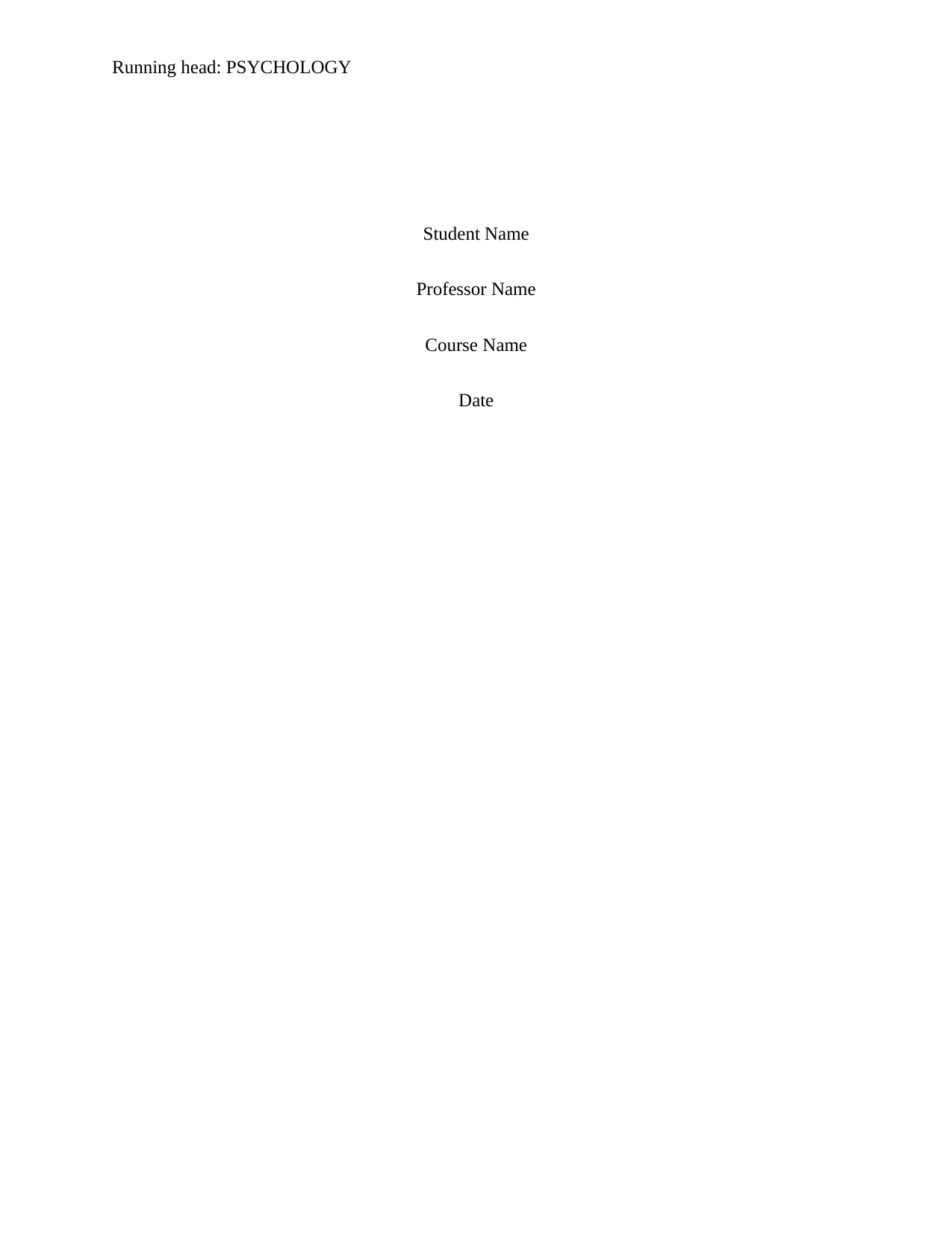
Running head: PSYCHOLOGY
Student Name
Professor Name
Course Name
Date
Student Name
Professor Name
Course Name
Date
Paraphrase This Document
Need a fresh take? Get an instant paraphrase of this document with our AI Paraphraser
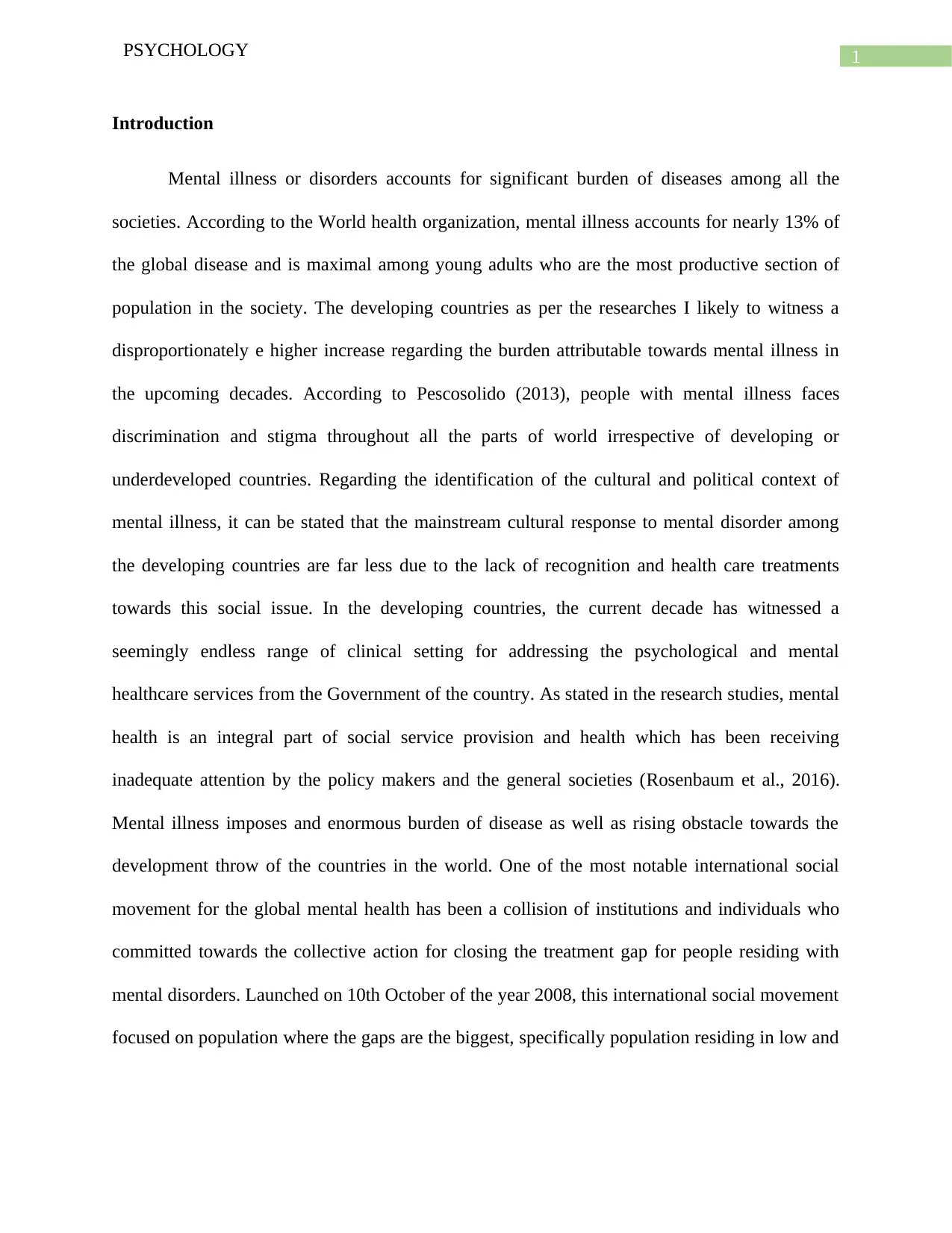
1PSYCHOLOGY
Introduction
Mental illness or disorders accounts for significant burden of diseases among all the
societies. According to the World health organization, mental illness accounts for nearly 13% of
the global disease and is maximal among young adults who are the most productive section of
population in the society. The developing countries as per the researches I likely to witness a
disproportionately e higher increase regarding the burden attributable towards mental illness in
the upcoming decades. According to Pescosolido (2013), people with mental illness faces
discrimination and stigma throughout all the parts of world irrespective of developing or
underdeveloped countries. Regarding the identification of the cultural and political context of
mental illness, it can be stated that the mainstream cultural response to mental disorder among
the developing countries are far less due to the lack of recognition and health care treatments
towards this social issue. In the developing countries, the current decade has witnessed a
seemingly endless range of clinical setting for addressing the psychological and mental
healthcare services from the Government of the country. As stated in the research studies, mental
health is an integral part of social service provision and health which has been receiving
inadequate attention by the policy makers and the general societies (Rosenbaum et al., 2016).
Mental illness imposes and enormous burden of disease as well as rising obstacle towards the
development throw of the countries in the world. One of the most notable international social
movement for the global mental health has been a collision of institutions and individuals who
committed towards the collective action for closing the treatment gap for people residing with
mental disorders. Launched on 10th October of the year 2008, this international social movement
focused on population where the gaps are the biggest, specifically population residing in low and
Introduction
Mental illness or disorders accounts for significant burden of diseases among all the
societies. According to the World health organization, mental illness accounts for nearly 13% of
the global disease and is maximal among young adults who are the most productive section of
population in the society. The developing countries as per the researches I likely to witness a
disproportionately e higher increase regarding the burden attributable towards mental illness in
the upcoming decades. According to Pescosolido (2013), people with mental illness faces
discrimination and stigma throughout all the parts of world irrespective of developing or
underdeveloped countries. Regarding the identification of the cultural and political context of
mental illness, it can be stated that the mainstream cultural response to mental disorder among
the developing countries are far less due to the lack of recognition and health care treatments
towards this social issue. In the developing countries, the current decade has witnessed a
seemingly endless range of clinical setting for addressing the psychological and mental
healthcare services from the Government of the country. As stated in the research studies, mental
health is an integral part of social service provision and health which has been receiving
inadequate attention by the policy makers and the general societies (Rosenbaum et al., 2016).
Mental illness imposes and enormous burden of disease as well as rising obstacle towards the
development throw of the countries in the world. One of the most notable international social
movement for the global mental health has been a collision of institutions and individuals who
committed towards the collective action for closing the treatment gap for people residing with
mental disorders. Launched on 10th October of the year 2008, this international social movement
focused on population where the gaps are the biggest, specifically population residing in low and
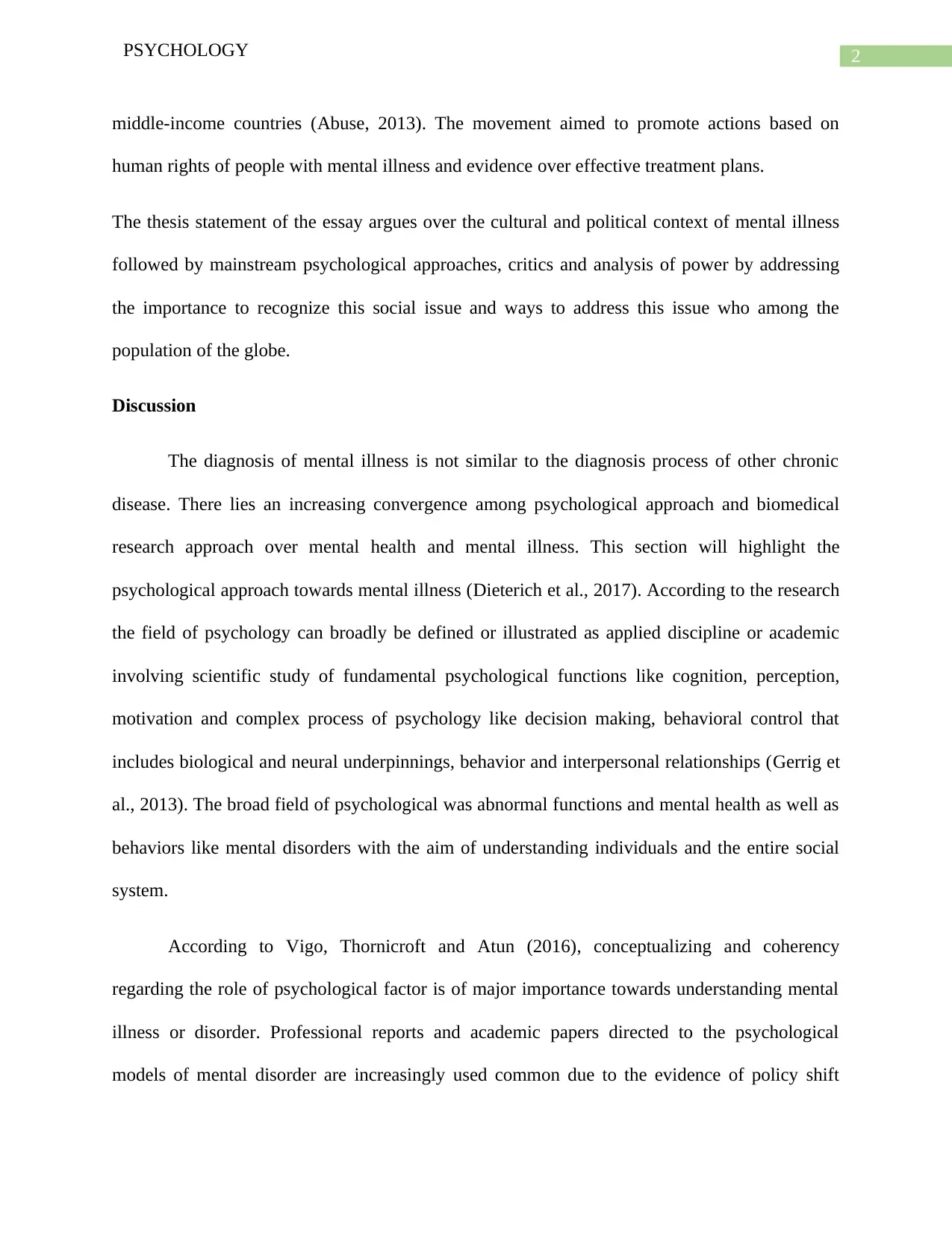
2PSYCHOLOGY
middle-income countries (Abuse, 2013). The movement aimed to promote actions based on
human rights of people with mental illness and evidence over effective treatment plans.
The thesis statement of the essay argues over the cultural and political context of mental illness
followed by mainstream psychological approaches, critics and analysis of power by addressing
the importance to recognize this social issue and ways to address this issue who among the
population of the globe.
Discussion
The diagnosis of mental illness is not similar to the diagnosis process of other chronic
disease. There lies an increasing convergence among psychological approach and biomedical
research approach over mental health and mental illness. This section will highlight the
psychological approach towards mental illness (Dieterich et al., 2017). According to the research
the field of psychology can broadly be defined or illustrated as applied discipline or academic
involving scientific study of fundamental psychological functions like cognition, perception,
motivation and complex process of psychology like decision making, behavioral control that
includes biological and neural underpinnings, behavior and interpersonal relationships (Gerrig et
al., 2013). The broad field of psychological was abnormal functions and mental health as well as
behaviors like mental disorders with the aim of understanding individuals and the entire social
system.
According to Vigo, Thornicroft and Atun (2016), conceptualizing and coherency
regarding the role of psychological factor is of major importance towards understanding mental
illness or disorder. Professional reports and academic papers directed to the psychological
models of mental disorder are increasingly used common due to the evidence of policy shift
middle-income countries (Abuse, 2013). The movement aimed to promote actions based on
human rights of people with mental illness and evidence over effective treatment plans.
The thesis statement of the essay argues over the cultural and political context of mental illness
followed by mainstream psychological approaches, critics and analysis of power by addressing
the importance to recognize this social issue and ways to address this issue who among the
population of the globe.
Discussion
The diagnosis of mental illness is not similar to the diagnosis process of other chronic
disease. There lies an increasing convergence among psychological approach and biomedical
research approach over mental health and mental illness. This section will highlight the
psychological approach towards mental illness (Dieterich et al., 2017). According to the research
the field of psychology can broadly be defined or illustrated as applied discipline or academic
involving scientific study of fundamental psychological functions like cognition, perception,
motivation and complex process of psychology like decision making, behavioral control that
includes biological and neural underpinnings, behavior and interpersonal relationships (Gerrig et
al., 2013). The broad field of psychological was abnormal functions and mental health as well as
behaviors like mental disorders with the aim of understanding individuals and the entire social
system.
According to Vigo, Thornicroft and Atun (2016), conceptualizing and coherency
regarding the role of psychological factor is of major importance towards understanding mental
illness or disorder. Professional reports and academic papers directed to the psychological
models of mental disorder are increasingly used common due to the evidence of policy shift
⊘ This is a preview!⊘
Do you want full access?
Subscribe today to unlock all pages.

Trusted by 1+ million students worldwide
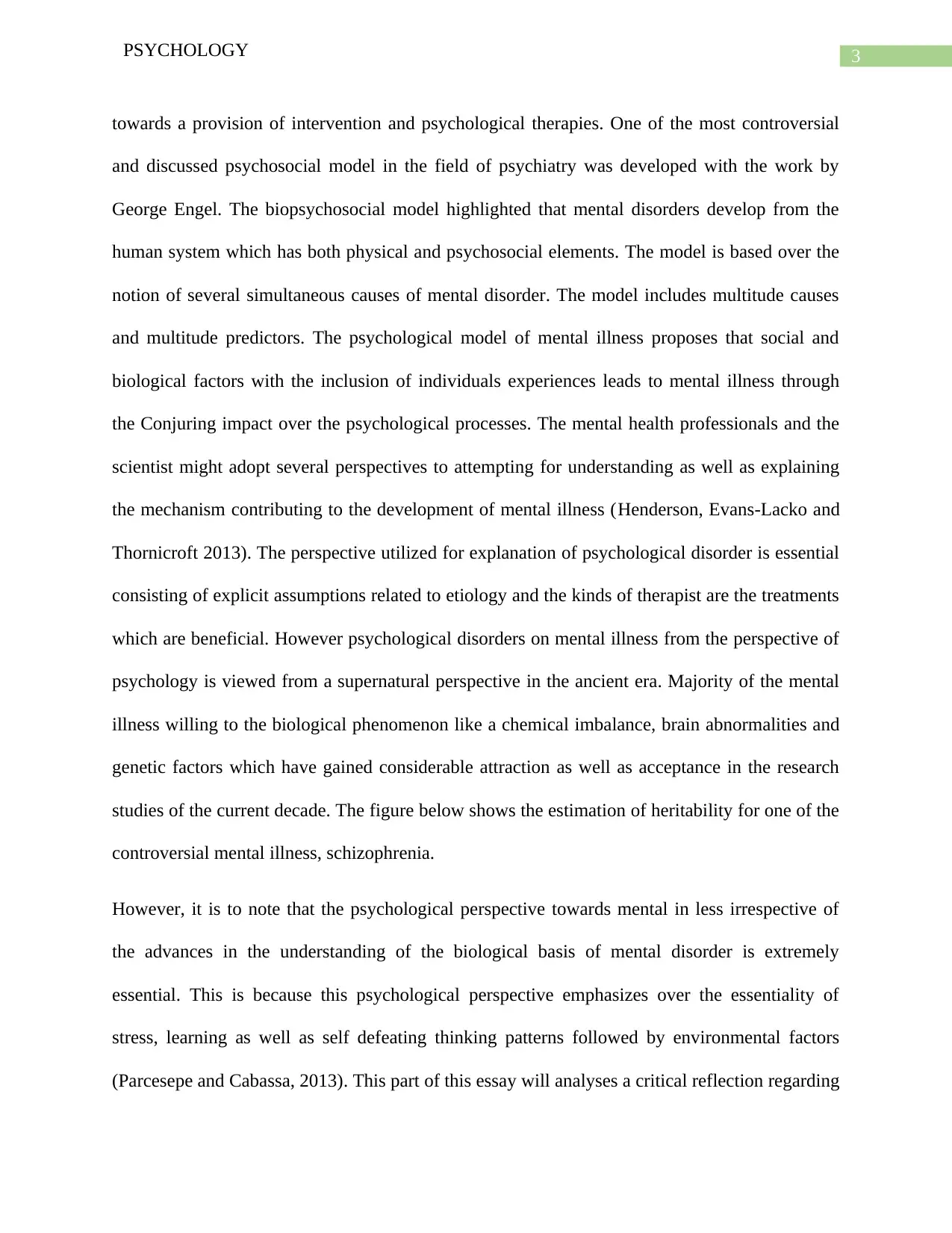
3PSYCHOLOGY
towards a provision of intervention and psychological therapies. One of the most controversial
and discussed psychosocial model in the field of psychiatry was developed with the work by
George Engel. The biopsychosocial model highlighted that mental disorders develop from the
human system which has both physical and psychosocial elements. The model is based over the
notion of several simultaneous causes of mental disorder. The model includes multitude causes
and multitude predictors. The psychological model of mental illness proposes that social and
biological factors with the inclusion of individuals experiences leads to mental illness through
the Conjuring impact over the psychological processes. The mental health professionals and the
scientist might adopt several perspectives to attempting for understanding as well as explaining
the mechanism contributing to the development of mental illness (Henderson, Evans-Lacko and
Thornicroft 2013). The perspective utilized for explanation of psychological disorder is essential
consisting of explicit assumptions related to etiology and the kinds of therapist are the treatments
which are beneficial. However psychological disorders on mental illness from the perspective of
psychology is viewed from a supernatural perspective in the ancient era. Majority of the mental
illness willing to the biological phenomenon like a chemical imbalance, brain abnormalities and
genetic factors which have gained considerable attraction as well as acceptance in the research
studies of the current decade. The figure below shows the estimation of heritability for one of the
controversial mental illness, schizophrenia.
However, it is to note that the psychological perspective towards mental in less irrespective of
the advances in the understanding of the biological basis of mental disorder is extremely
essential. This is because this psychological perspective emphasizes over the essentiality of
stress, learning as well as self defeating thinking patterns followed by environmental factors
(Parcesepe and Cabassa, 2013). This part of this essay will analyses a critical reflection regarding
towards a provision of intervention and psychological therapies. One of the most controversial
and discussed psychosocial model in the field of psychiatry was developed with the work by
George Engel. The biopsychosocial model highlighted that mental disorders develop from the
human system which has both physical and psychosocial elements. The model is based over the
notion of several simultaneous causes of mental disorder. The model includes multitude causes
and multitude predictors. The psychological model of mental illness proposes that social and
biological factors with the inclusion of individuals experiences leads to mental illness through
the Conjuring impact over the psychological processes. The mental health professionals and the
scientist might adopt several perspectives to attempting for understanding as well as explaining
the mechanism contributing to the development of mental illness (Henderson, Evans-Lacko and
Thornicroft 2013). The perspective utilized for explanation of psychological disorder is essential
consisting of explicit assumptions related to etiology and the kinds of therapist are the treatments
which are beneficial. However psychological disorders on mental illness from the perspective of
psychology is viewed from a supernatural perspective in the ancient era. Majority of the mental
illness willing to the biological phenomenon like a chemical imbalance, brain abnormalities and
genetic factors which have gained considerable attraction as well as acceptance in the research
studies of the current decade. The figure below shows the estimation of heritability for one of the
controversial mental illness, schizophrenia.
However, it is to note that the psychological perspective towards mental in less irrespective of
the advances in the understanding of the biological basis of mental disorder is extremely
essential. This is because this psychological perspective emphasizes over the essentiality of
stress, learning as well as self defeating thinking patterns followed by environmental factors
(Parcesepe and Cabassa, 2013). This part of this essay will analyses a critical reflection regarding
Paraphrase This Document
Need a fresh take? Get an instant paraphrase of this document with our AI Paraphraser
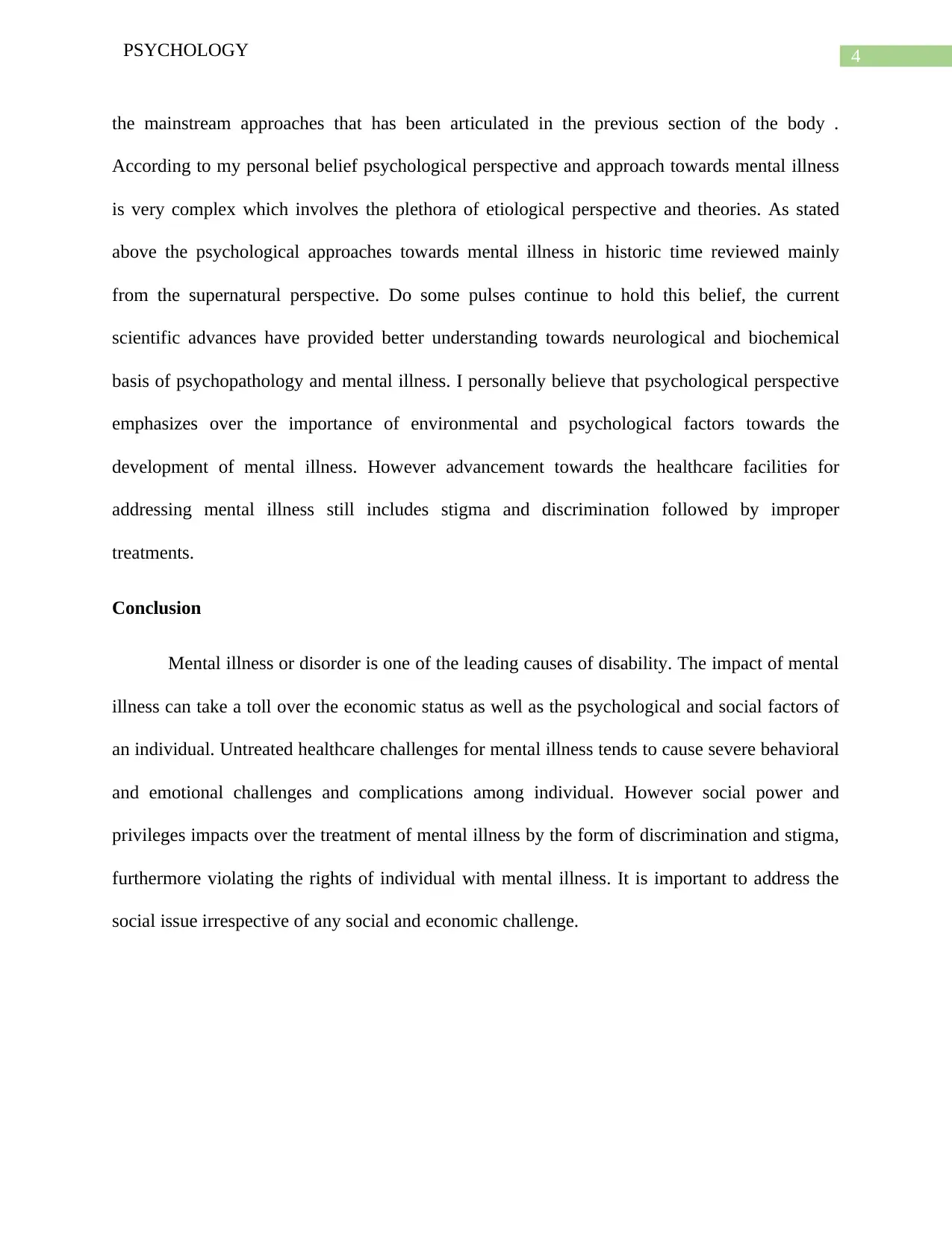
4PSYCHOLOGY
the mainstream approaches that has been articulated in the previous section of the body .
According to my personal belief psychological perspective and approach towards mental illness
is very complex which involves the plethora of etiological perspective and theories. As stated
above the psychological approaches towards mental illness in historic time reviewed mainly
from the supernatural perspective. Do some pulses continue to hold this belief, the current
scientific advances have provided better understanding towards neurological and biochemical
basis of psychopathology and mental illness. I personally believe that psychological perspective
emphasizes over the importance of environmental and psychological factors towards the
development of mental illness. However advancement towards the healthcare facilities for
addressing mental illness still includes stigma and discrimination followed by improper
treatments.
Conclusion
Mental illness or disorder is one of the leading causes of disability. The impact of mental
illness can take a toll over the economic status as well as the psychological and social factors of
an individual. Untreated healthcare challenges for mental illness tends to cause severe behavioral
and emotional challenges and complications among individual. However social power and
privileges impacts over the treatment of mental illness by the form of discrimination and stigma,
furthermore violating the rights of individual with mental illness. It is important to address the
social issue irrespective of any social and economic challenge.
the mainstream approaches that has been articulated in the previous section of the body .
According to my personal belief psychological perspective and approach towards mental illness
is very complex which involves the plethora of etiological perspective and theories. As stated
above the psychological approaches towards mental illness in historic time reviewed mainly
from the supernatural perspective. Do some pulses continue to hold this belief, the current
scientific advances have provided better understanding towards neurological and biochemical
basis of psychopathology and mental illness. I personally believe that psychological perspective
emphasizes over the importance of environmental and psychological factors towards the
development of mental illness. However advancement towards the healthcare facilities for
addressing mental illness still includes stigma and discrimination followed by improper
treatments.
Conclusion
Mental illness or disorder is one of the leading causes of disability. The impact of mental
illness can take a toll over the economic status as well as the psychological and social factors of
an individual. Untreated healthcare challenges for mental illness tends to cause severe behavioral
and emotional challenges and complications among individual. However social power and
privileges impacts over the treatment of mental illness by the form of discrimination and stigma,
furthermore violating the rights of individual with mental illness. It is important to address the
social issue irrespective of any social and economic challenge.
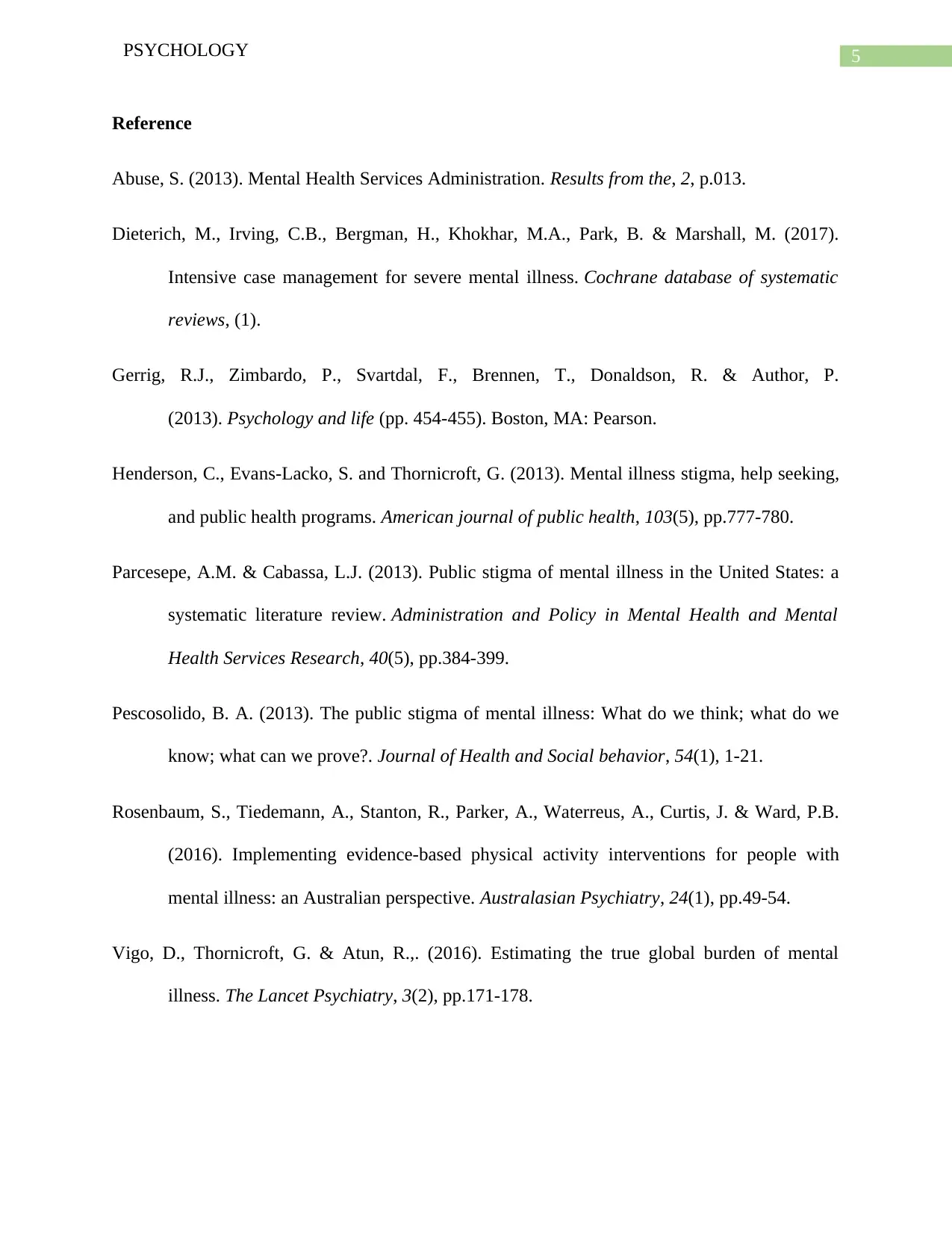
5PSYCHOLOGY
Reference
Abuse, S. (2013). Mental Health Services Administration. Results from the, 2, p.013.
Dieterich, M., Irving, C.B., Bergman, H., Khokhar, M.A., Park, B. & Marshall, M. (2017).
Intensive case management for severe mental illness. Cochrane database of systematic
reviews, (1).
Gerrig, R.J., Zimbardo, P., Svartdal, F., Brennen, T., Donaldson, R. & Author, P.
(2013). Psychology and life (pp. 454-455). Boston, MA: Pearson.
Henderson, C., Evans-Lacko, S. and Thornicroft, G. (2013). Mental illness stigma, help seeking,
and public health programs. American journal of public health, 103(5), pp.777-780.
Parcesepe, A.M. & Cabassa, L.J. (2013). Public stigma of mental illness in the United States: a
systematic literature review. Administration and Policy in Mental Health and Mental
Health Services Research, 40(5), pp.384-399.
Pescosolido, B. A. (2013). The public stigma of mental illness: What do we think; what do we
know; what can we prove?. Journal of Health and Social behavior, 54(1), 1-21.
Rosenbaum, S., Tiedemann, A., Stanton, R., Parker, A., Waterreus, A., Curtis, J. & Ward, P.B.
(2016). Implementing evidence-based physical activity interventions for people with
mental illness: an Australian perspective. Australasian Psychiatry, 24(1), pp.49-54.
Vigo, D., Thornicroft, G. & Atun, R.,. (2016). Estimating the true global burden of mental
illness. The Lancet Psychiatry, 3(2), pp.171-178.
Reference
Abuse, S. (2013). Mental Health Services Administration. Results from the, 2, p.013.
Dieterich, M., Irving, C.B., Bergman, H., Khokhar, M.A., Park, B. & Marshall, M. (2017).
Intensive case management for severe mental illness. Cochrane database of systematic
reviews, (1).
Gerrig, R.J., Zimbardo, P., Svartdal, F., Brennen, T., Donaldson, R. & Author, P.
(2013). Psychology and life (pp. 454-455). Boston, MA: Pearson.
Henderson, C., Evans-Lacko, S. and Thornicroft, G. (2013). Mental illness stigma, help seeking,
and public health programs. American journal of public health, 103(5), pp.777-780.
Parcesepe, A.M. & Cabassa, L.J. (2013). Public stigma of mental illness in the United States: a
systematic literature review. Administration and Policy in Mental Health and Mental
Health Services Research, 40(5), pp.384-399.
Pescosolido, B. A. (2013). The public stigma of mental illness: What do we think; what do we
know; what can we prove?. Journal of Health and Social behavior, 54(1), 1-21.
Rosenbaum, S., Tiedemann, A., Stanton, R., Parker, A., Waterreus, A., Curtis, J. & Ward, P.B.
(2016). Implementing evidence-based physical activity interventions for people with
mental illness: an Australian perspective. Australasian Psychiatry, 24(1), pp.49-54.
Vigo, D., Thornicroft, G. & Atun, R.,. (2016). Estimating the true global burden of mental
illness. The Lancet Psychiatry, 3(2), pp.171-178.
⊘ This is a preview!⊘
Do you want full access?
Subscribe today to unlock all pages.

Trusted by 1+ million students worldwide
1 out of 6
Related Documents
Your All-in-One AI-Powered Toolkit for Academic Success.
+13062052269
info@desklib.com
Available 24*7 on WhatsApp / Email
![[object Object]](/_next/static/media/star-bottom.7253800d.svg)
Unlock your academic potential
Copyright © 2020–2026 A2Z Services. All Rights Reserved. Developed and managed by ZUCOL.




